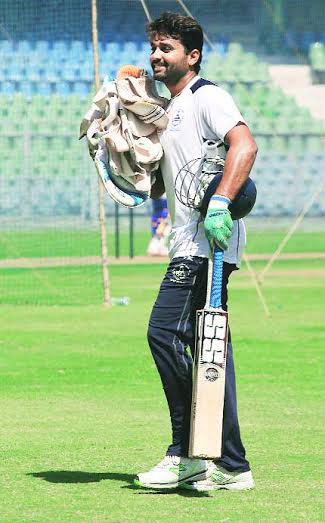A life less ordinary
Murali Vijay made his Test debut as opener for India in 2008 as a replacement for Gautam Gambhir, who was serving a one-match ban for an on-field altercation.
It was a small hotel room without any beds. It’s not known what a driver and another man, the original inhabitants of the room, thought when a 17-year-old boy checked in on a summer’s day and, like them, slept on the floor. Little would they know that the quiet teenager who shared their room in T Nagar, a bustling marketplace in Chennai, for six months would go on to open for the Indian Test cricket team one day. Even the boy didn’t know what lay ahead.
Murali Vijay was looking for himself then. He had walked out of his home after flunking his Class XII exams and he had at least six months to find out about life as an adult. “I had told my parents, ‘Don’t worry, I won’t commit suicide, I won’t do anything stupid, I just want to live on my own and find what I want’,” he says. He was 17 and he loved his mother (“one person I can give my life for”), and there he was alone, trying to make something of his life. Not the usual back story of a Test cricketer, but there you go.
It’s clear that his lived experiences have moulded this man — experiences that are uncommon not because they don’t happen to others, but because he went out of his way to seek them. In a world where cricket stars appear to be designed by branding gurus, Vijay is anything but fake.
It isn’t as if the 31-year-old doesn’t care what’s thought of him. Just before he went on a tour of England last year, he sought out a couple of journalists and asked them why he is perceived as “arrogant”. We mumbled something then but I was to return to that question and to a more specific answer, involving his marriage, in this recent conversation. But let’s not get ahead of the story.
Around the time he stepped out of the comfort of his home, his father’s business had run into trouble. Vijay recalls his father as a “different” man. “He remained calm even when things weren’t going well and never passed on any sense of worry or panic to my sister and I. My mother is a very strong person,” he says.
Once, Vijay was told if studies weren’t his thing, then perhaps he should think of becoming a peon. A stray reaction of a worried father, perhaps, for Vijay doesn’t recall any rancour. He just remembers it as one of the “triggers” in his life. “My whole family was into studies and would cry for that one mark which didn’t get them 100. I was the complete opposite. My sister scored 98 per cent in Class XII. I got 40. My outlook was to get out there, travel, meet people and do something. Bookish knowledge never appealed to me. I got no kick out of it. I was not a bad student, mind you!” he says.
Seeking a “kick” is fine but leaving home at that age? Vijay says he was sitting at home one day when he began to introspect. “What am I doing with my life? Am I making the right decisions? Can I live alone? I wanted to try it out before I fell back on my parents’ support,” he says. He knew he had to follow his heart.
Deluxe Hotel in T Nagar was to be his home for the next six months. He didn’t tell his close friends about it initially and found work at a snooker parlour. Woke up to exercise, went to the parlour, and somehow fitted cricket in between. He even joined a “chain business” he says, a multi-level pyramid like Amway. “If I got two or three people into it, I would get some commission,” he says.
He learnt many things about himself, some were just confirmations. “I was always street-smart and if so required, I can survive on the street. Maybe that’s my philosophy. That period helped me become independent. I knew I could survive on anything and anywhere. You know what you are exactly,” he says.
“I used to visit my parents, of course. They never felt that I was doing anything wrong. We used to be well-off — but my parents had lost money. My father never gave much importance to wealth. He would talk about how it is important to treat people well. I didn’t understand then, I understand now,” he says.
It wasn’t easy, of course. For anyone, leave alone a teenager. Nearly every night, Vijay says, he would think: “Chuck this, let me go back home”. “There was this fear, about money and hunger” but he knew he had to last six months to see what he was made of. Once he cleared his exams, and got admitted to Vivekananda College in Mylapore, Chennai — once known for its academic excellence, and always for promoting sports, especially cricket — Vijay was in his element.
He didn’t return home, though. He would stay for a week before wandering off to his friends’ homes. Some nights were even spent at the cricket ground. Be it the YMCA or the IIT cricket ground, ringed by trees, “wherever my mood took me that day,” he says with a smile.
“I am a weird character. My friends mean a lot to me. Their parents used to treat me as their own son. They pushed me hard to play cricket. They knew I wasn’t good at studies but didn’t make me look for a job. They knew that I was born to play cricket. They believed a lot more in me as a cricketer than I did. Srinath, Harish, Vineet ..” the names roll out.
With Srinath, he had gone to see Sachin Tendulkar bat against Pakistan in the famous Chennai Test in 1999 where Tendulkar made an epic 136 in the run chase. Tendulkar and Mongia were in a match-turning partnership, or so it seemed, when Vijay saw Tendulkar shouting at Mongia. “I told Srinath, be silent, see Tendulkar is shouting at Mongia for some false shot. This was before lunch and Mongia then came back and hit another big shot and got out,” he says. Vijay walked out of Chepauk at the fall of Tendulkar’s wicket — Pakistan won by 12 runs — with a firm resolve that one day he would play in that stadium. “As a youngster, I would go and see S Sharath and S Sriram (Tamil Nadu’s Ranji Trophy stars) bat there and my desire of playing there strengthened,” he says.
Back in college, he was having fun with the cricket team. He had started to play with the leather ball only at the age of 17 and when he wasn’t selected for the under-19 state team, he turned to college cricket to discover the joy of the game. “Whatever game would be happening, I would go and play. If I got a call about a match, I would be there: 8 am or 1 in the afternoon, multiple times a day. I also wanted to show my parents that I was doing something,” he says.
It was then that Bharat Arun, currently Indian team’s bowling coach and a noted figure in Tamil Nadu cricket, spotted him and asked him to play for Chemplast team in Chennai’s club cricket league. Diwakar Vasu, another former Tamil Nadu player, who was in charge of Chemplast told him he might not get to play in the first five matches but if he waited, he would get a chance. “I got a chance and haven’t looked back since,” he says.
He was forced, however, to stop and pause at least a few times. One came early, at the age of 21, when he found out that he wasn’t selected for the Tamil Nadu team because he had long hair. Or so he believes. “That’s what my sources told me and I was shocked. It’s a weird feeling: I didn’t understand. What’s hair got to do with cricket? What does it really say? How can you judge my attitude on that? If I do not supporting my teammates, or come late for training or make mistakes on the field, these things can be addressed. Not your hair or the way you speak, or smoke,” he says.
It was an early lesson in image management that continues to haunt him. He might be a proud man but he wasn’t going to let coiffure stand in between him and his dream. And off he went that evening to chop off the hair.
“It was difficult for me to change people, so I decided to change myself. I told myself I can grow back the hair anytime. Cricket was my ultimate thing. I don’t have an ego with cricket. I was a little brash perhaps, arrogant, short-tempered; I didn’t know exactly what to say to people,” he says.
He then makes a critical observation about being a professional player. “In team sport, people usually judge you on your performance but how you carry yourself also matters. That’s what I didn’t understand or else I could have played for India much earlier. For me, 30 runs is sometimes more valuable than 150 — that’s how I see the game but I also saw that the others didn’t. (He is talking of his pre-India days here.) It took a while for me to understand,” he says.
As the conversation progressively turns to how people perceive him, I bring up the old question he had asked once about his negative image. Vijay’s marriage in 2012 was one of the reasons behind that perception. There was a triangular mess involving a Tamil Nadu Ranji teammate and India player Dinesh Karthik, his wife, and Vijay. It played out in the tabloid press in Chennai and across the country in salacious detail. There was no word from Vijay at all then, or much from Karthik. The stories kept spinning and churning and reached the sports pages of the national dailies. It subsided only after it came out that Vijay had married her. But, perhaps, the damage was done.
Vijay doesn’t squirm or slip into any defence of himself. Instead, he looks up and answers in a measured tone. “I am not one to share personal stuff. I didn’t feel like saying anything then. Something had gone wrong. I felt it inside me. I didn’t have to say it to others. There were major things happening, of course, and it involved three human beings. I thought we handled it well. There was no need to explain to people. Because people are going to talk anyways. And you can’t stop them from talking,”he says.
At the time, he went back to what his father told him. “As long you are making the right decision and you have a clear conscience, you don’t owe anyone an explanation, even your parents,” he says. His mother told him to do the right thing and that she would support him. “I didn’t want to explain myself. Even if I did, they (the media) were going to write in a different way. What’s the point then?” he asks.
The media did call. “Boss I know what I did,” Vijay recalls telling one of them. “What’s the point of threatening me? You write what you want. I am not scared. You don’t tell me to do something. After a point, it’s my life. I can’t tell 10,000 people and explain what happened,” he says.
It was a difficult time, with things spinning out of control. “But I didn’t want to put anyone down. If I spoke, it was going to be worse. Rather than that, I should just take it. For what I had done, just take it and move on — that’s what I told myself. I respect my parents. I know I had put them in a fix. They said you have done it and you realise it. Do the best you feel. As long as my partner is happy and she knows who I am, that’s that,” he says.
That was that indeed. It’s been a great last year or so, with Vijay cementing his spot in the Test team. He says he knows his time in ODIs and T20s will also come. He was upset when he wasn’t picked as the third opener for the World Cup but his temperament is such that he doesn’t remain upset for too long. “Look, it’s a gift to play for the country and earn a living playing this wonderful game. You can’t get too greedy! All I can do is to give my best,” he says.
Vijay has, of course, persevered to make it happen, like he did when his career hit a roadblock after he was dropped from the Test team after a tour of West Indies in 2011. “My batting was a bit loose then, if you know what I mean. I had gone there on the back of a decent IPL and didn’t understand how to adapt. I would just go with the flow,” he says.
He went back to basics and worked with his coach Jayakumar, to whom he is grateful, and Bharath Reddy, former India wicketkeeper and mentor. “I would be nobody if not for them, they gave me immense confidence,” he says. It wasn’t about technique at that point. “But I didn’t understand the synchronisation of mind and body. I alternated between blocking in one session and going on the attack in the next. Even in domestic games. Now I am more aware,” he says.
Vijay is an outsider by temperament, who nevertheless has stayed within the system, goaded by his survival instinct and by his fierce desire to excel and have fun with cricket. He seems at a happy, peaceful and confident space about his game, and his life. He has a four-year-old son Nirav and a six-month-old daughter Iva. “Nirav means happy soul and Iva is the light (of my life),” he says with a smile.
The Test Specialist
* Murali Vijay has played 31 Tests and totalled 2188 runs at an average of 39.78. He has played just 14 ODIs and his last ODI was in July 2013.
* He made his Test debut as opener for India in 2008 as a replacement for Gautam Gambhir, who was serving a one-match ban for an on-field altercation.
* He got his first full series of Test cricket in 2011 against West Indies but was dropped at the end of it.
*Made a Test comeback in 2012 against Australia and hit back-to-back 150s. It’s in the last 18 months that he has really cemented his place at the top. In the last 13 Tests, through four overseas tours starting from South Africa in December 2013 to Australia in January 2015, he has made 1080 runs at an average of 41.53 with two hundreds and seven fifties.
* In his last nine Tests, five in England and four in Australia, he has averaged 49.11 with two hundreds and six fifties.
Source:: Indian Express







